Peter MALONE
Art of Love
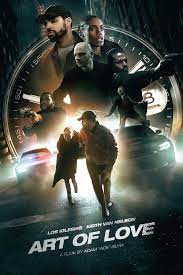
ART OF LOVE/ Romantik Hirsiz
Turkey, 2024, 98 minutes, Colour.
Esra Bilgic, Birkan Sokullo.
Directed by Recai Karagöz.
Western audiences do not see many Turkish romantic comedies. Here is an opportunity.
While the film is Turkish with a Turkish cast, it certainly resembles Hollywood romantic comedies – think Brad Pitt and Angelina Jolie!
And, it is in the tradition of To Catch a Thief, the central character being an art expert but also a member of Interpol, involved with her partner to pursue a thief who is expert, steals paintings which are not considered so valuable, and disappears.
And, the thief is very suave, with two assistants, IT surveillance backup, a driver for getaways, enabling him to steal paintings. He is wealthy and the thefts are all for his enjoyment and skills.
And, he has been in a relationship in the past with the Interpol investigator.
Lots of beautifully photographed locations, Budapest, Istanbul and, especially, Prague.
And, various twists in the relationship between the two as they meet again, she keeping secret her investigation, he with his own secrets.
The kind of easy entertainment that looks as if it could come from any country.
- A To Catch a Thief romantic heist story? Turkish? But international in style? Hollywood style?
- The range of locations, beautiful, glossy, Istanbul, Budapest, Prague, audiences enjoying immersion in the locations? The musical score?
- Setting up the robberies, the range of paintings, not masterpieces, the thief, the IT connections, his assistant and her surveillance, advice? Getting the paintings out of the galleries? The further robberies, and Istanbul, and Prague, and from the entrepreneur’s underground gallery?
- Interpol, Alin, the partnership with Ozan, the background, studies, police training, Interpol? Story of her relationship with Guney, his disappearance, the past love, reactions? Involvement in the case? Working with her partner, examining the provenance of all the paintings, making connections, the art of love, speculating about the next robbery in Istanbul? The proposal to the chief? His reservations?
- The reappearance of Guney, wealthy businessman, entrepreneur, his press conference? Alin and her suspicions, trying to trap him, seeing him, his getting away? Her determination to trap him, the setup at the party, his seeing her, the flirtation, the relationship, her involvement, her leading him on, masked and invading the office, been caught by the assistant, her suspicions, the driver-partner? The invitation to go to Prague? Going to the rehearsal of the dance? His attentions to her, her response? Ozon and his keeping an eye on her?
- Chasing him in Prague, his getting away? The return to Istanbul? Accompanying him to the party, the entrepreneur and his manner, boastful, taking down to his personal gallery, the tunnels, the security, the range of paintings? Guney and his decision to steal one?
- The final robbery, the technology, the hologram, the face, the mask, the voice recordings? His getting in, means from his assistant, the pursuit of the entrepreneur? Alien and her presence, warning the entrepreneur? The successful robbery?
- The police, Ozon and arresting the entrepreneur, charges?
- Billy, collaboration with the police, keeping the paintings, and reuniting with a friend?
- Turkish version of a romantic comedy?
Goodbye Julia
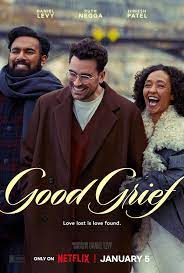
GOODBYE JULIA
Sudan, 2023, 120 minutes, Colour.
Eiman Yousif, Siran Riak, Nazar Goma, Ger Duany.
Directed by Mohammed Kordofani.
A rare film from Sudan. Which makes audiences realis she film e they need to see more films from Africa, of life in Africa, social issues, racial issues, religious issues. And Goodbye Julia takes us into the heart of Khartoum, 2005 and the possibilities for peace between the North and the South, then to 2011 with the vote for establishing the new country of South Sudan.
The film was written and directed by Mohammed Kordofani, from the North, drawing on his own memories, acknowledging the prejudices of the North, Arabic, against the South, African tribes.
But, while there is strong political background, this is a story of relationships, friendships, but, sadly, built on fear and deceptions.
While the title focuses on Julia (Siran Riak, a former Miss South Sudan, model, her first acting role, absolutely convincing), there is also an equal focus on Mona (Eiman Yousif, a singer in her first acting performance, also absolutely convincing). The film introduces Mona, wealthy Arab her patriarchal husband, tensions in the marriage, very comfortable living. And then suggestions of protests and violence against the Arabs by the Southerners.
It is then we meet Julia, a southerner born in Khartoum, husband, ther son, Daniel, evicted from lodgings, finding tent shelter with family, and, then, tragedy.
Perhaps this is enough indication of aspects of the plot, best for audiences to enter, emotionally, initially disturbed, into the way that the lives of Mona and Julia come together. One can say there is unforeseen tragedy, emotional pressures on people who have made mistakes, conceal the truth, fear, certainly not looking very far ahead to anticipate the consequences of lying.
Mona employs Julia as a maid, inviting her and her son to stay in the house, a beautifully deepening friendship between the two women and the boy fascinated by Mona’s husband and his woodwork, the boy showing great talent in this field.
Once the situation is established, the time frame moves from 2005 to 2011, the particular focus on the vote for the establishing of South Sudan. The years have passed, the women are friends, the boy is at school, a campaigner for the referendum becomes friendly with Julia and her son. And the vote. Then, as the audience has been waiting, consequences, the truth of the situations is revealed.
While the issue of race is strongly dramatised, the sense of superiority of the Arabs and their dismissing of the Southerners as slaves, there is also the dramatisation of the Catholicism of the Southerners (statistics indicate that 52% of citizens of Sudan are Catholics, with quite a number of Anglicans and Protestants). There are some sympathetic sequences in a Catholic Church, the choir, indicating possibilities of shared understandings.
In many ways, this is a valuable film in its portrayal of humanity, friendships, betrayals, hopes and reconciliation. And valuable for taking its audience into Sudan.
- Rare film from Sudan? History? Racial tensions? Arabs and Southerners? Separation of South Sudan? The narrative in the 2000s?
- Filming in Khartoum, the vistas of the city, the different neighbourhoods? The affluent couple and their home, the streets, the temporary accommodation, tent cities? Schools, churches, clubs? The musical score?
- The introduction, Mona and Akram, the marriage, age, tensions, the breakfast, his patriarchal attitudes, Mona as long-suffering, the revelation about their marriage, Mona’s background as a singer, the band, the relationship with Tariq, giving up the singing, the issue of the divorce? Her inability to have children? Keeping this from her husband? The visits to the doctor? Establishing an atmosphere?
- The rioters, demonstrations, the burning of the car, tensions between North and South?
- The contrast with Julia and her husband, Daniel? Julia born in the north, family from the South? Her husband and his photography? Their being evicted because of the troubles? Taking refuge with the sister, the tent set up? Julia, her grinding the flour? Selling at the market?
- Mona, going to the club in the burqa, driving the car, not paying attention, hitting Daniel, the father pursuing her, stopping, locking the door, phone, driving away? His pursuing her on the bike, the confrontation at the house, the Akram and the gun, shooting him? The police, the cover up, documentation, rid of the body?
- Julia, Daniel and his being hurt, getting up? Husband not returning, the search, the police, the funerals of the group killed, Julia wanting to find the body? Time passing?
- Mona, not telling the truth, the consequences? Akram consoling her, his explanations? Effect on her at home, with the doctor? The visit to the market, talking with Julia, buying the goods? Julia and the extra gift? Mona and the decision about the maid, approaching Julia, her work, marking the cups and plates with red for Julia’s use, the tasks around the house?
- The police and the tent city, burning it down, Julia getting her possessions, talking with Mona, Mona offering them accommodation, the work?
- The Catholic background, Julia ss Catholic, the Southerners, the priests and their support, going to the church, the ceremonies? The school for Daniel, Mona paying the fees, for the uniform, Daniel going to school, Mona and Julia bonding?
- Mona, her dealing with the police, deceiving Akram, the police contact, the information, the wallet and her hiding it, the information? His later presumption, fending him off, bribe?
- The years passing, the situation of 2011, the vote for the separation between North and South? The political background? Julia from the North, not wanting to leave? The encounter with Majier, his background, political stances, military? The later meetings with Julia, the attraction, with Daniel, at the social function, standing in the water, his approach, Julia walking away? The campaigning for the vote, the media, public opinion, protests?
- The years passing, the bond between Julia and Mona, deep, yet based on deception? Daniel, growing up, at school, the bullying, the visit with the authorities? Daniel and his bonding with Akram, doing the woodwork with him? Calling him uncle?
- Mona visiting the Church with Julia and joining the choir?
- The vote, people lining up, Julia and her vote?
- The gradual revelation of the truth, the neighbour and his moving, the bike exposed, Daniel seeing it, the discussions with Mona, continuing her deception, disappearance of Daniel’s father? Majier and his men, the involvement, the confrontation, Akram with the gun? The truth about the bike?
- Mona, the confession to Julia, Julia revealing that she suspected something because of the overpayment, finding the wallet, Julia’s concern?
- Julia leaving, the help of the photographer?
- Julia and Daniel, leaving for the South?
- Akram and Mona, the frank talk, his patriarchal attitudes towards her singing, jealousy of Tariq? His decision, Mona leaving, her singing and career?
- Insight into the situation in Sudan by characters and interactions, Arabs versus Africans from the south, prejudices, Islam and Catholicism, the setting up of the new country and celebration?
- A plea for understanding, respect, reconciliation, forgiveness, peace?
Big Dog, The
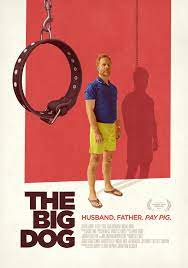
THE BIG DOG
Australia, 2023, 83 minutes, Colour.
Julian Garner, Felicity Price, Asher Boswarva, Michael Monk.
Directed by Dane McCusker.
The Big Dog is a brief Australian comedy with serious undertones and satiric overtones. The dog of the title lives next door to the family, continually barking throughout the film – and attempts to silence it, temporary permanently. And that is the climax to the film!
However, this is a story of Richard, Julian Garner, a middle-aged stockbroker who is not particularly successful at his work, is unsettled in his marriage, has a lazy son who is turning 18.
But, the key to the film is Richard and his going online with a dominatrix, Princess Paige, Asha Boswarva, platonic because always online, but some ludicrous interactions, his being humiliated, she relishing her power, especially in emptying his account which has serious consequences with his wanting to buy a lavish car for his son, revealing to his wife that the account is empty.
The action takes place over the one day, his wife, Felicity Price, trying to prepare a meal for the party and her husband not cooperating, her discovering the truth, and some resentment that she had not been able to pursue studies in the past, stifling her life as wife and mother. She discovers her husband’s behaviour as does her son who approaches the dominatrix and propositions her.
At the end, the dominatrix comes to the house, and the tone of the film seems to change to something of a dramatisation of a therapy session, Richard confronting his behaviour, his limitations, the consequences.
So, Richard is a blend of the serious and the ludicrous. The screenplay and direction are by first-time writer-director, Dane McCusker.
- The title, the presence of the dog, continued barking, and the attempts to get rid of it? The finale? Setting the tone of the film?
- The setting, the harbour mansions, the streets and views, interiors? The contrast with the scene for the dominatrix? The musical score?
- The tone of the film, the underlying serious themes, the satirical presentation of the characters and their behaviour, interactions?
- Richard’s story, age, long marriage, lazy son, taking after his father, tensions with his wife? Ability as a stockbroker – or not? A day in the life of…?
- Richard, the computer, online, the dominatrix, the tone of their interactions, platonic, humiliation, but the issue of money, Princess Paige and her control of his finances, emptying out his account? The consequences for him? Not having the money to buy the car he promised his son? Tensions with his wife, the preparation of the party, no invitations? The meal, cooking? His not concentrating? Phone call to his relative, the plea for the money, expectations of failure?
- Princess Paige, online, the dominatrix, her personality, commands – serious but the touch of the ludicrous? And Richard’s ludicrous responses? Seeing her in real life, the conversations with her roommate? Her work? Social work, political attitudes?
- Sam, in bed, dark room, lazy, his birthday, taking life for granted, interactions with his parents, the discovery of the link, the approach to Paige, the sexual approach and reaction?
- The day, getting worse for Richard, his wife discovering the truth, her response, interactions with Richard? With Sam? Her resentments about the marriage, Richard’s domination, her not being able to study and have a career?
- Paige and her arriving, her personality, less the dominatrix, more ordinary?
- The final part of the film, something of therapy session and style? The results?
- The finale and Richard and his wanting to get rid of the dog?
Pieces/ Australia
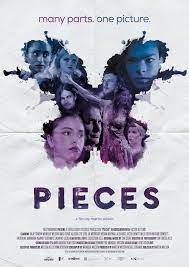
PIECES
Australia, 2022, 94 minutes, Colour
Monique Wilson, Alex Arco, Megan Aspinall, David Genat, Milu Green, Justin Hewitt, Jasmine Lucas, Katherine Marmion, Jasmine Lucas, John McIntosh, Dalip Sondhi, Ashanti Suriam, Allegra Teo..
Directed by Martin Wilson.
Pieces is a small budget feature film from Western Australia, featuring Perth, vistas of the city, but a focus on a centre for mental health and art therapy. The film was supported by HelpingMind and other organisations supporting mental health.
The film was written by Monique Wilson who takes the central role of a woman who runs the centre, with a grant, for art therapy for a range of people. There are five storylines within the framework. There is a depressed young woman and her supportive husband. There is a schizophrenic man who hears voices befriends a depressed girl. There is a young man, issues of sexual identity, keen on fashion, suicidal at times, clashes with his father. There is an older man, unsympathetic to mental illness and therapy, his wife with her troubles, disappearance, talent for dancing, and the young daughter. And, Alicia, the central character, has her own problems with her father and her mother’s suicide, and the angry outbursts and self-doubt of her daughter.
The situation of the film is the making of a documentary and a range of interviews with each of those at the centre, inappropriate questions, reactions, insightful questions.
The plotline moves to the various stories, intercutting them, the building up to a climax where there is damage to the centre but everybody banding together to build it up again, along with a dance music performance – and a melodramatic tragic event at the end.
The film to be recommended for those interested in therapy for those who have mental health difficulties, and the possibilities of art therapy.
- The background of mental health therapy? The film sponsored by HelpingMinds?
- The Perth setting, the vistas of the city, homes, workshops, the therapy centre? The musical score? The song, for dance?
- Alicia, her home story, relationship with her father, his later mental decline, relationship with her mother, her mother’s encouragement, sensitivity, suicide? Her own mental condition? Her daughter, the conflict with Violet, reconciliations, outbursts? The background of her divorce? Her committing herself to the therapy? Her philosophy of therapy, art, grounding people, their identity? Relationships with all those at the centre? And her own personal problems?
- Tom, the conflict with his father, outbursts, attempted suicide, his devotion to fashion, Alexander McQueen, styles, feathers, hair, clothes? His father, sympathetic, from feeling alienated? Their confrontations? Acceptance of his father, talking together, his father’s support? Bringing the power tools and helping in the cleanup? Tom and his talking with Violet, attempted suicides, support?
- Serge, schizophrenic, hearing voices, his artwork, personality, sympathetic? Outbursts? The friendship with Emerald, her background, attacked as being self-centred, the bonding with Serge? The discussions with Alicia?
- Cora and Lee, Cora and her depression, at home, discussions about pregnancy, ability and inability to care for a child? Lee, exasperation at home, coming to the centre, continued support of Cora?
- Raj, Indian background, his wife, daughter, his wife’s mental illness, disappearing, found naked, inability to care for her daughter, her love for her daughter, her ability for dancing? Raj, unsympathetic, the harsh comments, dismissing mental illness, dismissing soft therapies, wanting military service…?
- The work, the artwork, the mural, individual work, music, dance movement? The buildup to the final performance?
- The device of filming the documentary, Raj and his interventions, the range of questions, appropriate and inappropriate, the varying responses of all those interviewed?
- Violet, the clashes at home, the huge destruction at the centre, upending everything? Confession to her mother?
- The group coming together to put everything in order? The issue of grants, Alicia reluctant to tell others, the reactions? Final affirmation?
- The drama at the end, Raj, anger with his wife, Alicia and Violet, her father coming, the struggle, the shots, the father’s death?
- The film as a way of popular audiences having some kind of appreciation of mental illness, manifestations, consequences, care, therapy, affirmation, healing?
Kung Fu Panda 4
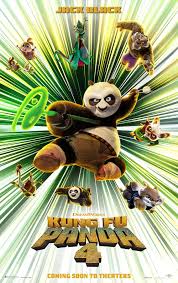
KUNG FU PANDA 4
US, 2024, 93 minutes, Colour.
Voices of: Jack Black, Awkwafina, Viola Davis, Dustin Hoffman, Bryan Cranston, James Hong, Ian McShane, Ke Huy Quan, Ronnie Chieng, Seth Rogen.
Directed by Mike Mitchell, Stephanie Stine.
It is already 16 years since we were introduced to the large Panda, Po, genial but not the brightest, working in his father’s noodle house, but becoming a chosen one, especially under the guidance of the Guru, Master Shifu, and destined to be the defender of his place and the assorted population, animals of every kind.
The animation is bright and colourful, the action, especially the martial arts combats, always lively. And the voices came from a large number of prominent Hollywood talent, starting with Jack Black enjoying himself as Po, with Dustin Hoffman voicing Master Shifu. There were the five champions of the region, there were villains. And there was combat, despite Po and his initial limitations.
Since his first film, there have been quite a number of short features with the his for Panda, more recently 42 episodes of a television series. And, for the theatres, there was one 2, Kung Fu Panda 3 now, eight years since the last movie, Kung Fu Panda 4.
Looking back over the synopses of the previous three films, we realise that the plot is virtually the same every time, Po, genial and awkward, taking his responsibilities seriously most of the time but often lackadaisical, confronting a variety of villains that turned up each time. And, it is much the same here. However, there is a challenge for Po, Master Shifu urging him to find and train a successor. But, Po enjoys his life and mission too much.
A lot of the previous villains are now in some kind of eternal dimension. So, here we have Chameleon and, shape shifting, absolutely sinister, power-hungry. In a variety of shapes and reverting back to her Chameleon shape, she is voiced by Viola Davis.
In the meantime, Po encounters the little Zhen, voiced by Awkafina, tantalising, quick in combat, continually challenging him.
Plenty of combat sequences, building up to Po versus Chameleon in an extended confrontation, the rising from their eternity of so many of the characters of the past, vanquished and imprisoned by Chameleon. And there is always the mischievous Zhen, freeing herself from the power of Chameleon – leading to who knows where, even a sequel!.
Po must be getting old because he does decide on his successor as he moves on to greater wisdom and responsibility (we hope!).
- The popularity of Kung Fu Panda? Films, television, the characters, the settings, colour, action? The musical score? The strong voice cast?
- The location, the Valley of Peace, the creatures, living in harmony, the noodle store, countryside, the mountains, the city by the sea and its interiors? Atmosphere?
- The same plot is the other films, the focus on Po, personality, size, weight, eating, martial arts skills, his role as defender? The combat sequences? His relationship with his 2 fathers?
- Master Shifu, his role of advice, the challenge to Po, wisdom, choosing a successor (and the comic sequence of the range of possible successors and their style)? His unwillingness?
- The 2 fathers, the store, the chatter, care for Po? The range of characters in the town? The opening, the creatures, the oppression, the enemy, the battle?
- The character of Zhen, small, cheeky, challenging, a skill with martial arts, the encounters with Po?
- The rising danger, Chameleon, her appearance, her voice, the shape shifting, becoming monstrous? Power hungry? Imprisoning the characters from the past and taking their power? Her power over is in? Zen and her rebellion? Siding with Po?
- The buildup to the confrontation, the elaborate battle, the shape shifting, the support of the older creatures, their past with Po, the support of him? The vanquishing of Chameleon? Master Shifu and his encouragement to fight?
- The future, accepting his destiny, the advice that he would know when he found his successor – and the challenge for Zhen?
Shirley/ 2023
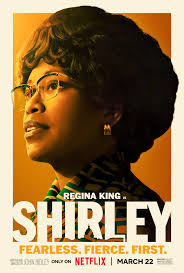
SHIRLEY
US, 2024, 117 minutes, Colour.
Regina King, Lance Reddick, Terrence Howard, Lucas Hedges, Michael Cherire, Brian Stokes Mitchell, Christina Jackson, Andre Holland, Dorian Missick, Reina King, Amirah Vann, W. Earl Brown.
Directed by John Ridley.
Shirley is Shirley Chisholm. She is a significant American personality from the 1970s. American audiences will respond to this portrait of her and her political campaigns. Audiences from outside the United States may be surprised to learn about her.
Some googling would be helpful. And, the television series, Mrs America, dramatising the Equal Rights movement in the United States in the 1970s features her as one of the protagonists. Shirley Chisholm was an African-American.
Regina King, Oscar-winner for If Beale Street Could Talk, gives a forceful performance as Shirley Chisholm. She is first seen campaigning to enter Congress, with captions indicating how few women, let alone black women, have been in Congress. She campaigns. She wins. She wants to have her say, the Democrat leader relegating her to a minor portfolio. She has to learn that there are steps in political rise.
But the action moves on quickly, groups urging her to stand for the presidency. For non-Americans this may be quite something of a surprise. In fact, she stood, a Democratic contender, in the 1972 election which eventually re-elected Richard Nixon.
While the film serves as a portrait of Shirley Chisholm, the focus is more on her campaign, her relentless commitment, her policies, social justice issues, meeting people, persuading protesters that they can achieve more through political involvement, even having a meeting with Huey Newton, leader of the Black Panthers and his urging support. One of the of the Democrat contenders was the governor of Alabama, the notoriously racist, George Wallace, an assassination attempt on him and Shirley going to visit him in hospital.
There is the quiet support of her husband of 19 years, Conrad (Michael Cherire), the wise advice of political guru, Mac (Lance Reddick in his final performance), Finance manager Arthur (Terrence Howard), young legal impressive physical enthusiast, Peter (Lucas hedges) and various collaborators as well as the hired campaign manager who eventually quits in desperate exasperation.
The film takes us inside campaigns, the pressure, the demands, backroom deals, counting numbers, persuasion, disappointments, betrayals.
There has been an African-American president of the United States, Barak Obama. And there has been a black vice president of the United States, Karmila Harris.
- The title, audience expected to recognise it? Audience knowledge of Shirley Chisholm? American knowledge? Beyond the US?
- The true story, the 1970s, the aftermath of the 60s, the Vietnam war, Richard Nixon, the 1972 election, the candidates, the Democrats against Nixon? Shirley Chisholm, Congress, her decision to stand, her campaigning?
- Introduction to Shirley Chisholm, Regina King’s performance, strong personality, 19 years married to Conrad, his support? Her political activities? Race issues? African-American? Within the decade after the March on Washington? Groups, women, support? Her feminist attitudes and stances? (And the collage of clips from feminists like Betty Frieden, Gloria Steiner and…)
- The campaign for Congress, support, her victory, with a group of new members of Congress, the photo, the few women (and the statistics about women, black women)? In the Congress, the allotment of the portfolio, rural issues, her reaction, the confrontation with the leader of Congress? Her impatience, her demands, advice for her to be more moderate?
- The decision to run, Congress, her determination, relationship with Mack, his advice, the relationship with Arthur and his fundraising, her relationship with her husband, Conrad? Her interest in Robert, his legal studies, political career, knowledge of youth politics, his being employed? The hiring of Stanley Townsend? His professionalism, know-how, practicality?
- The personalities of the advisers, in themselves, in relationship to Shirley, in the advice given, in the ups and downs of the campaign, her agreement, her rejecting, Townsend and his exasperation, eventually going?
- Shirley and her relationship with her husband, his devotion, 19 years, support? In the background? Feeling exasperated? The stand-off between the two? (And the information of the later divorce – and her marriage to Arthur and it being long-lasting?)
- The family situation, the sisters’ presence, criticism, relationship with their mother, churchgoing, memories of the father favouring Shirley? Surely reaching out but her hard personality? Mother and daughter watching the television, the phone call, the reconciliation?
- The various stages of the campaign? The energy, the meetings, the television interviews, the assessments of her opponents, the focus on George Wallace and his stances? His being shot, surely visiting him in hospital, advised against, the criticisms, especially from the African-Americans, the Black Panthers?
- Barbara, initial enthusiasm, with Shirley, protest versus political activity? Barbara, her involvement, working with Shirley, the link with the Black Panthers, setting up the meeting with Huey Newton? The discussions, arguments? His endorsement? Diane Carroll being the intermediary, her mansion, support of Shirley, the meeting?
- The issues of various states, her focusing on Florida, California and the winner taking all the votes? The character of Ron and Dylan’s, support, California, pressures, his betrayal with his votes? Also Form true, campaigning, flamboyant, California, interactions with Shirley, his votes?
- The ups and downs of the campaigns, politicking behind-the-scenes, meetings, phone calls, deals? The ultimate betrayal of the numbers? Shirley, acceptance, determination?
- The criticism of the film as not delving into Shirley’s personality more strongly, with Nuance? The focus on the campaign and the events and the issues?
- The significance of Shirley Chisholm, a black woman, politician, Congress, standing for Congress and for the presidency at such a period?
Ryuichi Sakamoto: Opus
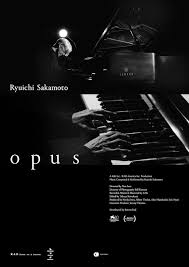
RYUICHI SAKAMOTO: OPUS
Japan, 2024, 103 minutes, Black-and-white.
Ryuichi Sakamoto.
Directed by Neo Sora.
Here is a documentary, a musical documentary, best viewed in a concert hall because, in fact, it is a piano recital on screen. For an individual audience, a small group, it would play well in streaming.
Ryuichi Sakamoto was a celebrated Japanese composer, musician and pianist. He composed a wide range of individual pieces and scored many films in Japan, features and short films, as well as internationally including his early work Merry Christmas, Mr Lawrence for Oshima, collaborations with Bernardo Bertolucci for the Last Emperor, The Sheltering Sky, Little Buddha. And, in later years, scoring the Oscar-winning The Revenant as well as the Japanese drama, one of his last compositions, Monster.
Diagnosed with terminal cancer of the throat, he decided to perform a piano recital for camera just months before he died in March 2023. His son was the director.
For those not familiar with the music of the composer and the recital of scores for films, sometimes the recital is unsettling. It is filmed in black and white (and so many reviewers and commentators have used the word “pristine”) camera focusing on the composer and his performance, close-ups of his hand and fingering, sometimes his pausing and using his hand and arm in the conductor fashion. And the camera moves across the piano, across the room, a variety of angles, a whole range of black-and-white visual compositions.
The film begins very slowly, quietly, the camera at the pianist back, gradually moving towards him, gradually revealing his face, his hands, his playing. While the focus is on the composer and his range of compositions, the film offers something of a masterclass in black-and-white photography and composition.
Sometimes the health of the pianist is precarious, sometimes he is asking for a break, commenting that his playing was not quite right, doing it again. However, with the close-ups on his face, on his white hair, his comment features, this film offers a visual portrait of Sakamoto as well and is a final collection of his compositions.
Perfect Days
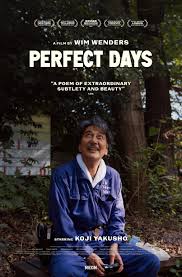
PERFECT DAYS
Japan/Germany, 2023, 124 minutes, Colour.
Koji Yakusho, Tokio Emoto,
Directed by Wim Wenders.
A new dawn, a new day, a new life… For me… And I’m feeling good - the lyrics of the Leslie Bricusse and Anthony Newley song, repeated throughout the film, but heard at quite some length at the end, the audience focusing on the benign face of Hirayami (Koji Yakusho in a wonderful performance) as he drives his truck on his way through the streets of Tokyo.
Here is a film about the goodness of human nature, kindness, human dignity.
Writer-director, Wim Wenders, has been making significant films for 50 years. He has had a special interest in Japan, making a documentary some years ago on the classic Japanese director, Yasijuro Ozu, and is paying tribute to him with Perfect Days. We are in the world of ordinary Japanese life, day by day, the vivid background of modern-day Tokyo, streets, high-rise, parks, diners, simple apartments. And, to the surprise of many audiences, toilets. For audiences who clean/have cleaned toilets, there will be a great deal of empathy with Hirayami and his day job, doing the rounds of Tokyo toilets, meticulous cleaning (even holding a mirror under a basin to detect any dirt), thorough. And this occupies most of his day – and a great deal of the first third of the film. We do become familiar, with him, with those toilets.
And he is content. He is a somewhat reclusive loner. No intimations of back story till the last part of the film. And, with his routines, repeated each day of the week, waking, folding bed and blanket, cleaning his teeth, opening the door, smiling at the sky, coffee from the vending machine, his truck, cleaning equipment, and on his rounds. There are some slight variations on his day off, especially to do his laundry. He has a sandwich in the park for lunch. He loves photographing the sky, the trees and leaves, watching characters in the park. He has a regular meal at a diner, returns home, and is an avid reader, shelves of books in his spartanly comfortable apartment. And the question as to whether he is on the spectrum with his meticulous regularity and detail.
There are other characters, especially his young associate who measures every experience out of 10!, cleans while looking at his mobile phone, his courting a girlfriend, needs money, overtures to Hirayami to sell his valuable collection of audiocassettes from the 70s and 80s. And then he quits.
Suddenly,Hirayami has a niece, running away from her mother who is alienated from Hirayami. Nor does Hirayami want to visit his now senile father. But, possibilities, as his sister does give the gift of his favourite chocolate.
So, Wenders shows great empathy for his character, a gentle Everyman figure, rarely speaking, somewhat more towards the end of the film. We cannot but help liking and admire him. And, music throughout the film, Japanese songs, English-language songs, Lou Reed, The House of the Rising Sun (in Japanese as well).
Cleaning toilets, quiet encounters with people, kindness, a regular life, books and music, each day is routine but a new dawn, a new life…
- The title and expectations? A Japanese story? German and Japanese perspectives on characters and stories? On the traditions of Japanese filmmaking?
- The career of Wim Wenders, movies, documentaries, many decades, international, interest in Japan, the films of Yasijuro Ozu, this film paralleling his films, a tribute to him?
- The importance of narrative? The important to focus on character? Action? Contemplation? Movies and experience?
- The musical score, the range of songs, English lyrics, Japanese lyrics, Lou Reed and his Perfect Days lyrics, Leslie Bricusse and Anthony Newley, a new world…?
- The presence and performance of Koji Yakusho? Age, appearance, serious, the smiles, reticent, speaking quietly under his breath, the later development and his communications? Audience interest, his being an enigma, audience appreciation of him? Goodness?
- The discipline of his apartment, bed, blanket and pillow, waking, the routine, each day, the smile, the sky, cleaning his teeth, the coffee from the vendor, his truck, taking his uniform? Repeated throughout the film – with some variations on his day off? The routine of his reading at night, his well stocked shelves, reading Faulkner, the Japanese essayist, buying Patricia Highsmith? Visiting the store, one dollar for a book?
- Audience response to his work as a toilet cleaner, the first half of the film and so much time spent in the toilets, Tokyo toilets and their being well appointed, his thoroughness, the detail, the mirror under the basin to detect dirt? Meticulous detail? The arrival of his co-worker, younger, casual, estimating everything out of 10, cleaning while looking at his mobile phone, music? Comparisons between the two?
- The simple life, satisfied, the routines? Relating to people, kindness? Bowing to people, to the shrine, to nature?
- The daily routine, the range of toilets, the customers, the children locked in, the little boy rescue, his mother not even saying thanks, the boy waving? Lunch, the trees and leaves, the sky? His always taking photos? The people encountered, the vagrant and his standing and movement, later seeing him in the street? The young girl sitting, eating the sandwich?
- The cumulative effect of watching Hirayami day by day? Audience questions about his back story, the young worker asking the questions for us, no answers? Hirayami always obliging, the young man, his girlfriend, to give her the lift, in the truck, playing the cassettes, the girl listening, taking one, later returning at and listening to it in the truck, weeping? The young man, the cassettes, going to the shop, their values, especially from the 70s and 80s? The young man asking for money, Hirayami giving it to him?
- Watching the behaviour of Hirayami, speculation about his past, his personality, his meticulous routines, the issue of his being on the spectrum? Sympathetically so?
- The effect of watching the toilet sequences, audiences who clean toilets identifying, audiences who have not had the experience puzzling about watching such detail? Hirayami as a very ordinary Everyman character?
- The other routines, the evening meal, the welcome from the staff, the drink, the food, the patrons watching the television, baseball? His continued returns? The older woman behind the counter, her welcoming him, the drinks, her singing at the House of the Rising In Japanese?
- The sudden arrival of his niece, the audience surprised to find he had a niece, the alienation from his sister? Her making herself at home, wanting to join him in the work, her discovery, sitting for lunch, the photos, the trees and leaves? Borrowing books?
- The significance of the photos, leaves and sunlight? The post-credits! And word for this kind of photography, interspersed throughout the film, dream sequences, at the end of each day, lines, shadows, black-and-white, some appearances of figures? Referred to as dream installations?
- His niece, alienation from her mother, her arrival, chauffeured, wanting her daughter home, the gift of the chocolate, memories of their father, in the aged care, his not wanting to visit his father? His niece always welcome?
- His associate phoning him, praising him, not turning up for work? The pressure on having to do the whole day shift by himself? Phone calls? Irritated? The next day, the woman arriving, rigid manner, the work?
- The enigmatic episodes to the end, the locked door, the restaurant and watching, the man and the woman, cycling away, the man coming to meet him, his explanations, terminal cancer, the shadows, the game of tag? The man ex-husband? The woman and Hirayami?
- Sharing the experience with him, an experience of human nature and goodness? The long focus on his smiling face of the end, driving his van, and the lyrics of a new dawn, a new day, a new world… For me, and I’m feeling good?
Godzilla x Kong: The New Empire
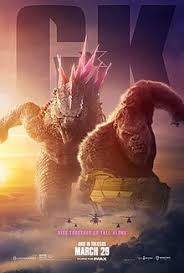
GODZILLA x KONG, THE NEW EMPIRE
US, 2024, 115 minutes, Colour.
Rebecca Hall, Brian Tyree Henry, Dan Stevens, Kaylee Hottle, Fala Chen, Rachel House.
Directed by Adam Wingard.
We need to check the title. In 2021, there was Godzilla vs Kong. Now, with a small letter change, we see that Godzilla and Kong art together, the “X” signifying that, if they do not necessarily love each other, they are now working together.
This is the continuation of a series of Godzilla and Kong films, a continuity in the plots. The first was: Kong: Skull Island, Kong re-emerging into our consciousness, and the discovery of the subterranean universe, Hollow Earth, and the young girl, the last of her tribe. The next step in the series was to focus on Godzilla – and Godzilla’s propensity for giant destruction. And then she’s too, the bringing together of the 2 giants in conflict. Now, peace between them in their coming to the aid of ordinary humans as well as the lost tribe.
The opening does not waste much time. We seem to return to the prehistoric world, monstrous creatures pursuing, Kong, literal cliff edge drama, and Kong’s infected tooth! Meanwhile Godzilla is running rampant in Rome, finally settling down to sleep and occupying the Colosseum!
Then back to the humans, Dr Ilene Andrews, Rebecca Hall, participant in the previous adventures, tTia, Kaylee Hottle, the little girl, who feels alienated at school. In the meantime, Trapper, Dan Stevens, is called with his multi-purpose plane, to hover over Kong in pain and extract his tooth and supply.a false tooth.
But, there are ominous signs. An expedition to Hollow Earth, including recruiting Bernie, Brian Tyree Henry, running his own pod cast, part of the previous expeditions.
Which actually means there is quite a lot of plot, the audience spending time with one, a lot of time with the next, and the next. There is Kong’s story, his discovering some rebel apes, including a little one who joins in the action, a variation on the Kingdom of the Planet of the Apes. Then there is the story of the tribe in Hollow Earth, quite an advanced civilisation, young Tia able to communicate, their being under threat by the apes, the veneration of the giant Mothra and bringing it alive again. Meanwhile, Godzilla has woken up in the Colosseum, submerged and travelling to the Arctic to replenish strength.
Whatever the communication, the next stop is Cairo, Godzilla doing some more trampling, especially on the pyramids, but Kong emerging, then making peace, Tia intervening, standing on the head of the Sphinx, and pact to join forces against the rebel apes.
It is a changed destruction in Rome and Cairo rather than in New York City, but the imagination stretches when, suddenly, they both turn up in Rio de Janeiro – more confrontations.
Bringing the 3 stories together means more action than we might have been anticipating, all in confrontation, a lot of bellowing from Kong, firebreathing from Godzilla, dangers for the humans, and Mothra joining in the attack.
It seems that this is a recipe for popular entertainment, fantasy and action, imagination, dangers and rescues, and considerable success at the box office. (A statistic: It is also the 38th film of the Godzilla franchise and the 13th film in the King Kong franchise.)
When and where will, in Godzilla combine again?
- The fifth film in the Godzilla-Kong series? Each film following the other? The establishing of the mythology of Kong and Skull Island? The mythology of Godzilla, size, power, destruction? The conflict between the two? This film bringing them together against common enemies?
- Audience response to the presence of Kong over the decades?
- The opening, Kong, the pursuit by the creatures, the prehistoric atmosphere, the creatures flying? The fight, the cliffs, the injury, the infected tooth? The tracker, called on by Ilene, the episode of extracting the tooth, the false tooth? Kong as friendly?
- Godzilla, the rampage through Rome, destruction, people, his settling in the Colosseum?
- Audience response to Godzilla? The Japanese background? Two giant creatures, relationship with humans, threats, connections, collaboration?
- The opening, Ilene Andrews had her work, her daughter and the background of her being mute, from the destroyed race? Hollow Earth? The research, financial difficulties? The sightings, the graphs, Tia, at school, the fantasies, drawings, Ilene’s concern? The linking of her drawings with the graphs?
- Trapper, adventurer, personality, skills, extracting the tooth, pilot and plane, the journey, his contribution to the action?
- Bernie, presence from the other films, technical knowledge, his podcast, his manner? Contact by Ilene? His wanting to go on the expedition? The pilot and his rough manner? The voyage to Hollow Earth? The post-deserted, the pilot swallowed by the tree? Atmosphere of fear?
- The time given to the story of the tribe, the sinkhole, being discovered, empty feeling at home, communication, the civilisation of the tribe, the buildings, the hieroglyphs? The role of Mothra? The threat by the rogue apes?
- Kong and discovering the rogue apes, the small ape, the conflict and fights, conquering, the invasion into the territory of the tribe?
- Godzilla, leaving Rome, going to the Arctic, replenishing powers? Being tracked? The Egyptian sequence, rampant through Cairo, the destruction of the pyramids, Kong emerging, conflict, teaming together, Tia appearing? On the head of the Sphinx? Control? The arrival of Mothra?
- Mothra, the mythology, in the underworld, being revived, coming to the rescue, saviour?
- The final confrontation and battle, the apes, the little lake helping,, the Titan and collaboration, Kong versus the Skar King, Godzilla and the destruction?
- Peace restored, the tribe safe, tear and her wanting to stay with Ilene? On and his leading the kingdom? Godzilla returning to the Colosseum?
Wicked Little Letters
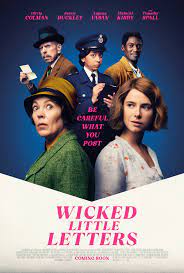
WICKED LITTLE LETTERS
UK, 2023, 100 minutes, Colour.
Dear Coleman, Jessie Buckley, Timothy Spall, Gemma Jones, Anjana Vasan, Eileen Atkins, Joanna Scanlan Lolly Adefope, Hugh Skinner.
Directed by Thea Sharrock.
They certainly are!
England, 1920, still feeling the aftermath of the war and the war dead, a small English village, Hampton. This is all based on an actual story, rediscovered in 2017, comic writer (half of the In-Between as, Jonny Sweet) saw it as an opportunity to write a wry British comedy. So, the basic facts might be based on reality, the way the characters act, their interactions, serious and comic, may not be held this episode actually was.
Wicked letters have unpleasant contents. In this case, they are highly offensive, scabrous, touches of the obscene, course and crass language, swearing. Those who might be feeling fastidious, it might be best to give this one a miss. But, for those prepared to take the language in its context, this is, in fact, an entertaining comedy was a lot of critique of British life. And the makers have decided to introduce a number of black characters, policewoman, judge, whether they would not have been present in 1920. It would be interesting to imagine how Ealing Studios might have made this film within the context of the 1950s.
Wicked little letters can be seen as anticipating the trolling of 21st-century social media.
The cast is excellent. Olivia Coleman has proven herself in a wide range of roles, from the Queen in The Crown to her Oscar-four as Queen one in The Favourite. And Irish actress-singer, Jessie Buckley, has also shown her talent in a variety of different roles. Here they are pitted against each other, Olivia Coleman as the very prim, religious, repressed and righteous, Edith, seen at home with her emotionally monstrous father, quite a different role for Timothy Spall, and her ever-patient, easily-offended mother, Gemma Jones. And she is the recipient of the letters, her mother upset, her father angry, going to report to the local police.
And, the main suspect lives next door, an unmarried Irish mother with the daughter, Rose, Jessie Buckley. Most audiences would realise very quickly that Rose did not write the letters – and not necessarily a surprise when we discover, half way through, who is writing the letters.
But, the police, a lot of satire in their presentation, instantly ready to arrest Rose. The chief is blustering and self-important. It is one assistant, played by Hugh Skinner, is rather dim but fancies himself. And they have Gladys, having to call herself “woman police officer Gladys Moss”, looked down on, dismissed as a suffragette, who eventually enlists the help of an interesting group of ladies in the town, fine cameos from veterans Eileen Atkins, Joanna Scanlon, Lolly Adefope, to defend Rose who has been carted off to jail (paying her bail), and elaborating schemes to unmask the letter writer.
The two leads bring their respective characters to vivid life, Rose with the touch of the raucous but kindly, victimised, Edith the epitome of biblical quotes, repression, subservient to her demanding father, not entirely unhappy with all the publicity in the media as the letters victim.
The film is often very funny – and the final outburst of obscenities, definitely in context and a damning judgement, will probably make most audiences burst out laughing!
- Based on a true story? The right treatment? Serious? Comic? A British treatment, satire on British society?
- The title, stories of poison pen letters? Anticipation of social media patrolling? The effect on those involved, the targets, investigations, unmasking?
- The atmosphere of the town, small, after World War I, memories of the war, the war dead, the Irish moving to England? Small town atmosphere, people knowing each other? The streets, the homes, adjacent? Shared facilities, the bath? Gossip?
- The situation, it is, her age, the past love and her dismissing him (and the real story of her father emerging later), at home with her mother and father, her religiosity, Bible reading? Completely subservient to her father? Her friendship with Rose, next door, talk, walk along the beach?
- Rose, Irish background, with her daughter, the story of her dead husband in the war, the relationship with Bill? Raucous, the lovemaking and the crucifixion banging on the wall? At the pub, drinking, shouting? Her language? Her love for her daughter?
- The letters, the content, the language, obscene, personal attacks? Edith and the letters, her mother and father, the reaction, her father going to the police?
- The police, the satiric presentation, the chief, rushing to conclusions, his busy life, disregarding the writing, wanting results? Castable paperwork, personality, a bit dim, the investigations, sexist towards Gladys? Collaboration with the Chief? The further investigations, the interrogations, the arrest?
- Conclusion that Rose was writing the letters, her comment that she needn’t have written but could have given the insult to verbally? Her arrest? Her daughter, Bill, everybody observing? Going to jail, the experience of jail, seeing Edith at the station giving her testimony? The police treatment? Her life in jail, acceptance?
- Edith, reading the Bible, giving the interviews, the media, her liking the celebrity?
- Edith and her parents, her dominating father, completely unsympathetic, ruling her life? Her mother, the effect of the letters, the death? The funeral? The priest, the prisoners, the memories?
- Edith and her playing twist? Her friends? Going to the club? The games, the talk? The friends and their own ideas, able, strong-minded, the discussions with And and Kate? Suspicions? Deciding to post bail? Welcoming Roses?
- Rose, the return home, awaiting trial? The support of the friends? The revelation about Nancy’s father, Bill being upset? Rose being branded a liar?
- The letters starting again, the various targets, the insults? Even the police? The police and their reaction, still targeting Rose, the issue of the writing?
- Gladys, her father is policeman, her training, 1920, the screenplay making a point about this impossible situation of the time? Her having to identify herself as woman police officer? The interviews with Rose, the documents, her suspicions, but of holding the letter of the law? Her treatment by the chief? By the constable? Are life at home? Her decision to intervene, looked down on by Edith’s father? The writing, particularly lettering? Her teaming up with Mabel and the others? Trying to catch Edith? Stalking her, the stamps and the envelope, the unmasking?
- Rose, the trial, her being outspoken, the prosecutor, the defence, the witnesses? Are being branded a liar?
- The reconciliation with can build, love for her daughter?
- Half way through, the audience, probably already suspecting, seeing Edith writing the letters, delighting in the language, the animosity? Her being trapped, her reaction?
- The reaction of her father, her being taken away, the fell-Marist blast given at the end – and the audience laughing?
- Serious? Funny? The use of language – and in this context?